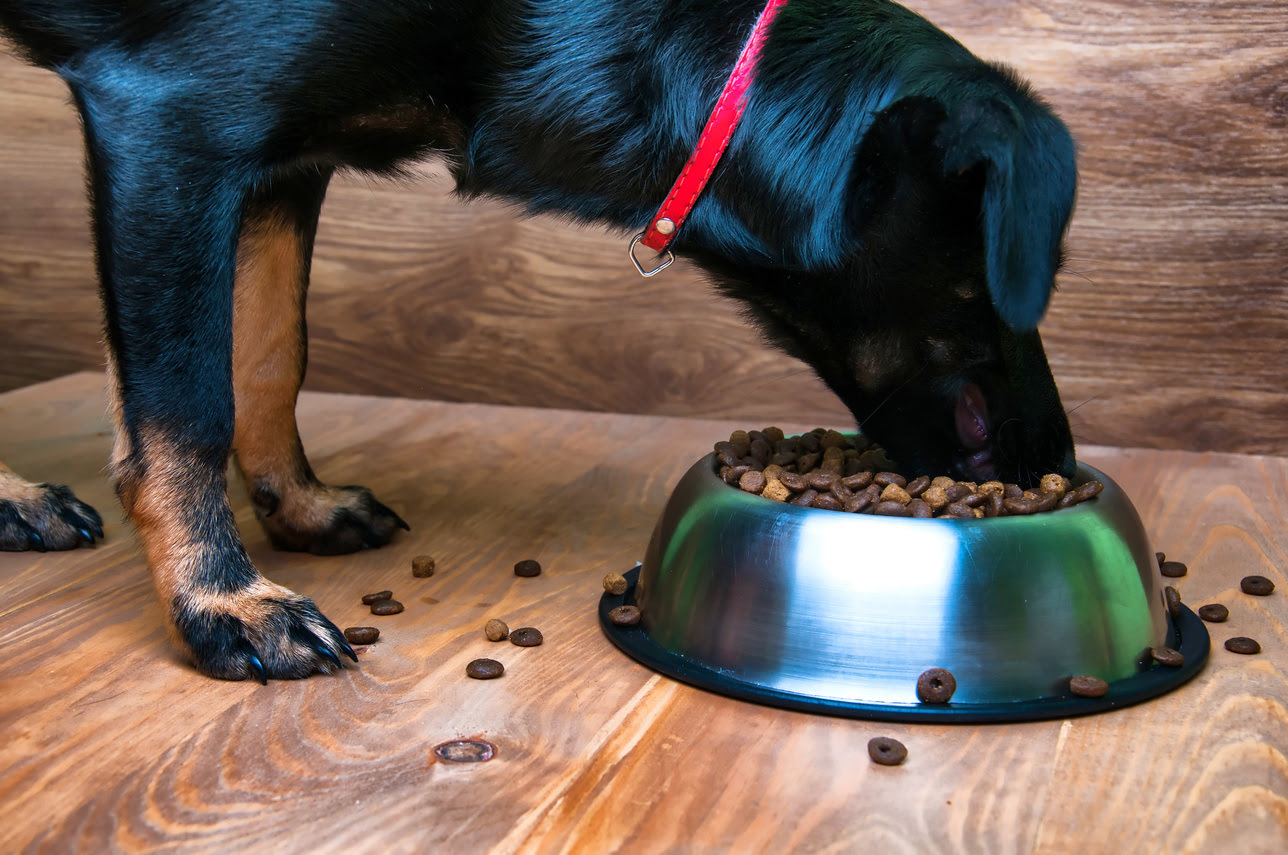Home>Health & Wellness>Common Health Issues>Muscular and Joint Health>What Is A Good Dog Food For Senior Dogs With Arthritis?


Muscular and Joint Health
What Is A Good Dog Food For Senior Dogs With Arthritis?
Modified: February 21, 2024
Discover the best dog food for senior dogs with arthritis, promoting muscular and joint health. Find the ideal nutrition to support your aging pet's wellbeing.
(Many of the links in this article redirect to a specific reviewed product. Your purchase of these products through affiliate links helps to generate commission for Pawsomeoldies.com, at no extra cost. Learn more)
Table of Contents
- Introduction
- Understanding Arthritis in Senior Dogs
- Importance of Good Nutrition for Senior Dogs with Arthritis
- Key Nutrients to Look for in Dog Food for Senior Dogs with Arthritis
- Common Ingredients to Avoid in Dog Food for Senior Dogs with Arthritis
- Best Dog Food Options for Senior Dogs with Arthritis
- Homemade Dog Food Recipes for Senior Dogs with Arthritis
- Conclusion
Introduction
As our beloved canine companions age, they may encounter various health challenges, with arthritis being a common concern among senior dogs. Arthritis, also known as osteoarthritis or degenerative joint disease, can significantly impact a dog's mobility and overall quality of life. It is characterized by inflammation and degeneration of the joints, leading to stiffness, discomfort, and reduced flexibility. Just like humans, senior dogs with arthritis require special attention and care, particularly when it comes to their diet and nutrition.
Proper nutrition plays a pivotal role in managing the symptoms of arthritis in senior dogs. By providing a well-balanced and tailored diet, pet owners can help alleviate discomfort, support joint health, and enhance their furry companions' overall well-being. Understanding the significance of good nutrition and identifying the key nutrients essential for senior dogs with arthritis is crucial in ensuring that they lead a comfortable and active lifestyle.
In this comprehensive guide, we will delve into the essential aspects of selecting the right dog food for senior dogs with arthritis. From understanding the specific nutritional needs of aging dogs to exploring the best food options and homemade recipes, this article aims to equip pet owners with the knowledge and insights necessary to make informed decisions about their senior dogs' diet. By the end of this guide, you will have a deeper understanding of how nutrition can positively impact the lives of senior dogs with arthritis, empowering you to provide the best care for your loyal companions. Let's embark on this journey to discover the power of nutrition in supporting the joint health and vitality of senior dogs.
Read more: What Is A Good Dog Food For Arthritis?
Understanding Arthritis in Senior Dogs
Arthritis is a prevalent condition among senior dogs, affecting their joints and causing discomfort and reduced mobility. As dogs age, the cartilage that cushions their joints may deteriorate, leading to inflammation, stiffness, and pain. This degenerative joint disease can significantly impact a dog's quality of life, making it essential for pet owners to recognize the signs and symptoms of arthritis in their senior canine companions.
One of the primary indicators of arthritis in senior dogs is a noticeable change in their mobility and activity levels. Pet owners may observe their furry friends experiencing difficulty when standing up, climbing stairs, or engaging in physical activities they once enjoyed. Additionally, dogs with arthritis may exhibit signs of discomfort, such as limping, reluctance to move, or vocalizing when attempting to move. These manifestations can be particularly evident after periods of rest, as the joints become stiff and painful.
It's important to note that arthritis in senior dogs is not a reversible condition, but its symptoms can be managed effectively with the right care and support. Understanding the impact of arthritis on a dog's well-being is crucial for pet owners to provide the necessary assistance and accommodations to ensure their furry companions lead comfortable and fulfilling lives in their golden years.
By recognizing the signs of arthritis and acknowledging its effects on senior dogs, pet owners can take proactive measures to address the condition and enhance their pets' overall quality of life. This includes implementing appropriate dietary adjustments, providing regular exercise tailored to their needs, and seeking veterinary guidance for comprehensive arthritis management.
In the next sections, we will explore the pivotal role of nutrition in supporting senior dogs with arthritis, delving into the essential nutrients and dietary considerations that can contribute to their joint health and overall well-being. Understanding the specific nutritional needs of senior dogs with arthritis is fundamental in formulating a holistic approach to managing this common age-related condition in our beloved canine companions.
Importance of Good Nutrition for Senior Dogs with Arthritis
Good nutrition plays a pivotal role in the overall well-being of senior dogs, particularly those grappling with arthritis. As dogs age, their dietary requirements undergo significant changes, and the importance of tailored nutrition becomes increasingly evident. When it comes to senior dogs with arthritis, the significance of a well-balanced and nutrient-rich diet cannot be overstated. Proper nutrition not only supports their joint health but also contributes to managing the symptoms of arthritis, thereby enhancing their quality of life.
Senior dogs with arthritis require a diet that addresses their specific nutritional needs, with a focus on promoting joint health and managing inflammation. A well-formulated diet can aid in maintaining a healthy weight, which is crucial for reducing the strain on arthritic joints. Additionally, certain nutrients play a key role in supporting joint function and mobility, helping to alleviate discomfort and stiffness associated with arthritis.
Furthermore, good nutrition can bolster the immune system of senior dogs, enabling them to better cope with the challenges posed by arthritis. Essential vitamins, minerals, and antioxidants present in high-quality dog food can contribute to overall health and vitality, potentially mitigating the impact of age-related conditions such as arthritis.
By providing senior dogs with arthritis the right balance of nutrients, pet owners can actively contribute to managing the progression of the condition and enhancing their furry companions' comfort. Moreover, a well-rounded diet can support muscle strength and overall body condition, which are essential for senior dogs to maintain their mobility and engage in daily activities with ease.
In essence, good nutrition serves as a cornerstone in the comprehensive care of senior dogs with arthritis. It not only addresses their specific dietary requirements but also plays a crucial role in managing the symptoms of arthritis and promoting their overall health and well-being. Understanding the importance of tailored nutrition for senior dogs with arthritis empowers pet owners to make informed decisions about their pets' diet, ultimately contributing to a fulfilling and comfortable life for their loyal companions.
Key Nutrients to Look for in Dog Food for Senior Dogs with Arthritis
When selecting dog food for senior dogs with arthritis, it is essential to prioritize key nutrients that can support joint health, manage inflammation, and contribute to overall well-being. Understanding the specific nutritional requirements of senior dogs with arthritis is fundamental in ensuring that their diet effectively addresses the challenges posed by this degenerative joint disease. Here are the key nutrients to look for in dog food for senior dogs with arthritis:
Glucosamine and Chondroitin
These two compounds are widely recognized for their beneficial effects on joint health. Glucosamine supports the production of cartilage and helps maintain its structural integrity, while chondroitin contributes to the elasticity and shock-absorbing properties of cartilage. Together, they can aid in reducing joint pain, improving mobility, and slowing down the progression of arthritis in senior dogs.
Omega-3 Fatty Acids
Omega-3 fatty acids, particularly EPA (eicosapentaenoic acid) and DHA (docosahexaenoic acid), possess anti-inflammatory properties that can benefit senior dogs with arthritis. These essential fatty acids help mitigate inflammation in the joints, potentially alleviating discomfort and stiffness. Additionally, omega-3 fatty acids support overall cardiovascular health and contribute to a lustrous coat and healthy skin in senior dogs.
Protein
High-quality protein is essential for maintaining muscle mass and supporting the overall body condition of senior dogs with arthritis. Adequate protein intake can aid in preserving muscle strength, promoting tissue repair, and facilitating optimal body function. Additionally, protein plays a crucial role in supporting the immune system, which is vital for senior dogs coping with age-related health challenges.
Antioxidants
Incorporating antioxidants such as vitamins C and E, selenium, and beta-carotene in the diet of senior dogs with arthritis can help combat oxidative stress and support their overall health. Antioxidants play a key role in neutralizing free radicals, which are implicated in joint inflammation and tissue damage. By including antioxidant-rich ingredients in their diet, senior dogs can benefit from enhanced immune function and reduced cellular damage.
Vitamin D
Vitamin D is essential for calcium absorption and bone health, making it particularly important for senior dogs with arthritis. Adequate levels of vitamin D can support bone density and joint function, potentially contributing to improved mobility and comfort. Ensuring that senior dogs receive sufficient vitamin D through their diet can aid in managing the impact of arthritis on their skeletal system.
By prioritizing dog food that contains these key nutrients, pet owners can actively support the joint health and overall well-being of their senior dogs with arthritis. Understanding the role of these essential nutrients empowers pet owners to make informed choices when selecting the most suitable diet for their furry companions, ultimately contributing to a comfortable and active lifestyle for senior dogs grappling with arthritis.
Common Ingredients to Avoid in Dog Food for Senior Dogs with Arthritis
When choosing dog food for senior dogs with arthritis, it is equally important to be mindful of the ingredients that may exacerbate inflammation, discomfort, or other symptoms associated with arthritis. Certain ingredients commonly found in commercial dog food products may have adverse effects on the joint health and overall well-being of senior dogs. By being aware of these potentially detrimental ingredients, pet owners can make informed decisions to avoid them in their senior dogs' diet.
-
Artificial Preservatives and Additives: Many commercial dog foods contain artificial preservatives and additives such as BHA (butylated hydroxyanisole) and BHT (butylated hydroxytoluene), which are used to prolong shelf life. These additives have been associated with inflammatory responses in the body and may exacerbate joint discomfort in senior dogs with arthritis.
-
Excessive Omega-6 Fatty Acids: While omega-3 fatty acids offer anti-inflammatory benefits, an imbalance with omega-6 fatty acids can promote inflammation. Dog foods high in omega-6 fatty acids, often derived from sources like corn and soybean oil, may contribute to an unfavorable omega-3 to omega-6 ratio, potentially intensifying inflammation in arthritic joints.
-
High Levels of Grain Fillers: Some commercial dog foods contain high levels of grain fillers such as corn, wheat, and soy. These ingredients are used as inexpensive fillers but may trigger allergic reactions or sensitivities in senior dogs, leading to inflammation and discomfort in their joints.
-
Excessive Salt (Sodium): High levels of sodium in dog food can contribute to water retention and may exacerbate swelling and discomfort in arthritic joints. Senior dogs with arthritis are particularly sensitive to the effects of excessive sodium, making it important to monitor their salt intake through their diet.
-
Low-Quality Protein Sources: Dog foods containing low-quality protein sources, such as meat by-products or unidentified meat meals, may lack the essential amino acids necessary for maintaining muscle mass and supporting overall body condition in senior dogs with arthritis. Inadequate protein quality can compromise their muscle strength and hinder their ability to cope with the physical demands associated with arthritis.
By being mindful of these common ingredients to avoid in dog food for senior dogs with arthritis, pet owners can take proactive steps to prioritize high-quality, nutrient-rich diets that support their furry companions' joint health and overall well-being. Understanding the potential impact of these ingredients empowers pet owners to make informed choices, ultimately contributing to a comfortable and active lifestyle for senior dogs grappling with arthritis.
Best Dog Food Options for Senior Dogs with Arthritis
When it comes to selecting the best dog food for senior dogs with arthritis, prioritizing high-quality, nutrient-dense options is paramount. Several reputable dog food brands offer formulations specifically tailored to address the unique nutritional needs of senior dogs, including those grappling with arthritis. These specialized formulations often incorporate key nutrients known to support joint health, manage inflammation, and promote overall well-being in senior canine companions.
One of the top considerations when choosing dog food for senior dogs with arthritis is the inclusion of glucosamine and chondroitin. These compounds are widely recognized for their beneficial effects on joint health, and several premium dog food options feature them as key ingredients. Additionally, omega-3 fatty acids, particularly EPA and DHA, are essential components of high-quality dog food for senior dogs with arthritis, as they possess anti-inflammatory properties that can help alleviate discomfort and stiffness in arthritic joints.
Furthermore, premium dog food options for senior dogs with arthritis often prioritize high-quality protein sources, such as real meat or fish, to support muscle strength and overall body condition. Additionally, these formulations tend to incorporate antioxidant-rich ingredients, including vitamins C and E, selenium, and beta-carotene, to combat oxidative stress and promote immune function in senior dogs.
When exploring the best dog food options for senior dogs with arthritis, it is crucial to seek formulations that avoid common detrimental ingredients, such as artificial preservatives and additives, excessive omega-6 fatty acids, high levels of grain fillers, excessive salt, and low-quality protein sources. By prioritizing dog food options that steer clear of these potentially inflammatory ingredients, pet owners can ensure that their senior dogs receive a diet that supports their joint health and overall well-being.
In addition to commercially available dog food options, some pet owners may opt for specialized prescription diets recommended by veterinarians to address the specific needs of senior dogs with arthritis. These prescription diets are formulated with a focus on managing the symptoms of arthritis and supporting joint function, offering a tailored approach to nutrition for senior dogs grappling with this degenerative joint disease.
Ultimately, the best dog food options for senior dogs with arthritis are those that prioritize high-quality, nutrient-rich ingredients, avoid potentially detrimental components, and are specifically formulated to address the unique nutritional requirements of aging dogs. By selecting premium dog food options tailored to support joint health and manage the symptoms of arthritis, pet owners can actively contribute to enhancing the comfort and vitality of their senior canine companions, enabling them to lead fulfilling and active lives in their golden years.
Homemade Dog Food Recipes for Senior Dogs with Arthritis
Providing homemade dog food offers pet owners the opportunity to tailor their senior dogs' diet to specifically address their unique nutritional needs, including those related to arthritis. When crafting homemade dog food recipes for senior dogs with arthritis, it's essential to incorporate ingredients rich in key nutrients known to support joint health and manage inflammation. Here are two wholesome and nutrient-packed recipes designed to promote the well-being of senior dogs grappling with arthritis:
Recipe 1: Turkey and Sweet Potato Delight
Ingredients:
- 2 cups cooked turkey (skinless and boneless)
- 1 cup cooked sweet potatoes, mashed
- 1 cup green beans, steamed and chopped
- 1 tablespoon olive oil
- 1 teaspoon ground turmeric
- 1 teaspoon dried rosemary
Instructions:
- In a large mixing bowl, combine the cooked turkey, mashed sweet potatoes, and chopped green beans.
- Drizzle the olive oil over the mixture and sprinkle with ground turmeric and dried rosemary.
- Thoroughly mix all the ingredients until well combined.
- Serve the turkey and sweet potato delight in appropriate portions for your senior dog, adjusting the serving size based on their individual dietary requirements.
This homemade recipe provides a balanced blend of lean protein from turkey, which supports muscle strength, and complex carbohydrates from sweet potatoes, offering sustained energy and essential nutrients. The inclusion of green beans contributes fiber and essential vitamins, while olive oil provides healthy fats and anti-inflammatory properties. Turmeric and rosemary, known for their anti-inflammatory and antioxidant benefits, further enhance the nutritional profile of this homemade dog food recipe, making it a wholesome option for senior dogs with arthritis.
Read more: What Is A Good Bath For A Dog With Arthritis
Recipe 2: Salmon and Quinoa Medley
Ingredients:
- 2 cups cooked salmon, flaked
- 1 cup cooked quinoa
- 1/2 cup carrots, finely grated
- 1/2 cup peas, steamed
- 1 tablespoon coconut oil
- 1 teaspoon ground ginger
- 1 teaspoon fresh parsley, finely chopped
Instructions:
- Combine the cooked salmon, quinoa, grated carrots, and steamed peas in a mixing bowl.
- Add the coconut oil, ground ginger, and fresh parsley to the mixture, ensuring thorough incorporation of all ingredients.
- Portion out the salmon and quinoa medley according to your senior dog's dietary needs, serving it as a nutrient-rich and flavorful homemade meal.
This homemade dog food recipe offers a wealth of nutritional benefits, with salmon providing omega-3 fatty acids that support joint health and reduce inflammation. Quinoa serves as a gluten-free source of protein and essential amino acids, while carrots and peas contribute vitamins, minerals, and dietary fiber. Coconut oil, known for its anti-inflammatory properties, complements the ingredients, and the inclusion of ginger and parsley further enhances the recipe's anti-inflammatory and antioxidant properties.
By preparing these homemade dog food recipes for senior dogs with arthritis, pet owners can ensure that their furry companions receive a wholesome and nutrient-rich diet tailored to support their joint health and overall well-being. These recipes offer a balanced combination of essential nutrients, anti-inflammatory ingredients, and flavorful components, empowering pet owners to actively contribute to the comfort and vitality of their senior dogs grappling with arthritis.
Conclusion
In conclusion, the well-being of senior dogs with arthritis is intricately linked to the quality of their diet and nutrition. As our loyal canine companions age, they may encounter the challenges posed by arthritis, a degenerative joint disease that can significantly impact their mobility and overall comfort. Understanding the pivotal role of nutrition in managing the symptoms of arthritis and supporting joint health is essential for pet owners seeking to provide the best care for their senior dogs.
Throughout this comprehensive guide, we have explored the multifaceted aspects of selecting the right dog food for senior dogs with arthritis. From understanding the specific nutritional needs of aging dogs to identifying key nutrients essential for supporting joint health, we have delved into the fundamental considerations that can positively influence the lives of senior dogs grappling with arthritis.
By prioritizing dog food options that incorporate essential nutrients such as glucosamine, chondroitin, omega-3 fatty acids, high-quality protein, and antioxidants, pet owners can actively contribute to managing the symptoms of arthritis and promoting the overall well-being of their senior dogs. Additionally, being mindful of detrimental ingredients commonly found in commercial dog food products empowers pet owners to make informed choices that align with their senior dogs' specific dietary requirements.
Furthermore, the inclusion of homemade dog food recipes tailored to address the nutritional needs of senior dogs with arthritis offers a personalized approach to supporting their joint health and overall vitality. These nutrient-rich recipes provide pet owners with the opportunity to craft wholesome meals that prioritize essential nutrients, anti-inflammatory ingredients, and flavorful components, ultimately contributing to the comfort and well-being of their senior canine companions.
In essence, the significance of good nutrition for senior dogs with arthritis cannot be overstated. By understanding the impact of arthritis on senior dogs and recognizing the role of tailored nutrition in managing the condition, pet owners are empowered to make informed decisions that positively influence the lives of their furry companions. Through a holistic approach encompassing high-quality commercial dog food options, specialized prescription diets, and nutrient-rich homemade recipes, pet owners can actively contribute to enhancing the comfort, mobility, and overall quality of life of their senior dogs grappling with arthritis.
As we navigate the journey of caring for our senior canine companions, let us continue to prioritize their well-being by embracing the power of nutrition in supporting their joint health and vitality. By doing so, we can ensure that our loyal companions enjoy a comfortable, active, and fulfilling life in their golden years, surrounded by the love and care they wholeheartedly deserve.












